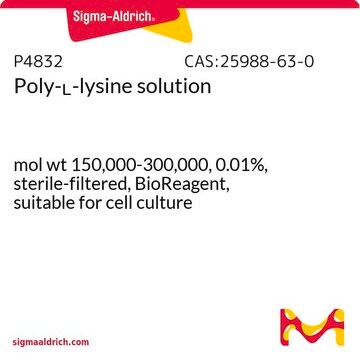일반 설명
Poly-L-lysine (PLL) is a versatile synthetic polymer derived from lysine. It serves as a positively charged, water-soluble polymer with applications in biology and biomedicine. One prominent role of PLL is in cell culture, where it′s applied to dishes and plates to enhance cell adhesion, particularly for cells with poor attachment capabilities. This is crucial for primary cells and certain cancer cell types. PLL′s positive charge forms a layer that attracts negatively charged molecules on cell surfaces, facilitating adhesion while minimizing cell toxicity compared to standard culture surfaces.Additionally, PLL finds utility in microscopy and neuroscience research. Coated substrates enable cells, tissues, and neurons to adhere to slides and culture dishes, facilitating detailed observations and prolonged studies. PLL eliminates the need for cell-damaging fixatives and allows extended cell and tissue culture. Beyond these applications, PLL is employed in immunochemistry to adhere tissues to slides for staining, drug delivery for encapsulating and delivering drugs, and gene therapy to transport genetic material to target cells. Overall, PLL is regarded as biocompatible, ensuring its safety in diverse biomedical applications and making it a valuable tool in biochemical and biomedical research.
애플리케이션
Poly-L-lysine polymers can be used in promoting cell adhesion to solid substrates, conjugation to methotrexate for increased drug transport, microencapsulation of islets, cell microencapsulation technology, microarray glass slide coating, and chromosomal preparations. Lower molecular weight poly-L-lysine (30,000-70,000) is less viscuous in solution, but higher molecular weight versions provide more attachment sites per molecule.
생화학적/생리학적 작용
Poly-L-lysine is a nonspecific attachment factor for cells useful in promoting cell adhesion to solid substrates by enhancing electrostatic interaction between negatively charged ions of the cell membrane and the culture surface. When it is absorbed to the cell culture surface, poly-L-lysine functions to increase the number of positively charged sites available for cell binding. With cells that can digest poly-L-lysine, poly-D-lysine should be used as the attachment factor.
특징 및 장점
- Suitable for Cell Culture and Biochemical research
- High-quality compound suitable for multiple research applications
성분
Poly-L-lysine is a positively charged amino acid polymer with approximately one HBr per lysine residue. The hydrobromide allows the poly-L-lysine to be in a crystalline form soluble in water. A small amount of product may be found in the beta structure because the HBr interferes with hydrogen bonding between amino and either the carboxyl groups or N or O containing moieties.
주의사항
Sterile solutions are stable for up to 2 years when stored at 2-8°C. It should be stored desiccated at -20°C.
제조 메모
This product has a molecular weight of 150,000-300,000. To remove the HBr, dissolve this product in a neutral buffer and dialyze to remove the salts. None of the poly-L-lysine products have been exposed to trifluoroacetic acid and are dialyzed to remove any monomers, dimmers, or trimers, confirmed by thin layer chromatography. In general, to use this product as an attachment factor, add 50 mL of sterile tissue culture grade water to 5 mg of poly-lysine, and aseptically coat the surface with 1 mL per 25 cm2 of solution. After 5 minutes, remove the solution through aspiration and thoroughly rinse the surface. Let dry for two hours before introducing cells and medium.
분석 메모
Molecular weight based on viscosity and is also assayed by MALLS.
기타 정보
For additional information on our range of
Biochemicals, please complete this
form.




